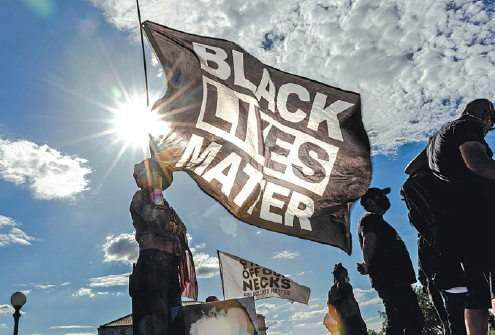One year since Floyd murder gripped US


As America reflects one year after the murder of George Floyd, President Joe Biden will meet privately with the Floyd family at the White House on Tuesday.
The meeting comes amid events in Minneapolis and other cities remembering and honoring Floyd, 46, a black man who was killed when white police officer Derek Chauvin knelt on his neck for more than nine minutes. Chauvin was found guilty in Floyd's murder.
Floyd's death in police custody reverberated not only across the US but around the world.
The meeting in Washington also will take place on the day that the president had wanted the George Floyd Justice in Policing Act to be passed by Congress.
The House of Representatives narrowly passed the bill in March. The act would ban chokeholds and no-knock warrants and create a national database for officers involved in misconduct investigations. The legislation has stalled in the Senate over issues including qualified immunity, which shields law enforcement officers from being sued by victims and their families for civil rights violations. Republicans have objected to the provision being scrapped.
Both parties acknowledged on Monday that they won't meet Biden's self-imposed deadline but insisted they still can find common ground.
"The most important thing is that we have a bill that hits the president's desk, not the date that it does," said Democratic Representative Karen Bass of California, who wrote the House version of the act.
Floyd's murder and the widespread protests over racial injustice and the use of excess force by police that followed have prompted several states to pass policing reform proposals. Since Floyd's death, there have been about 450 pieces of policing reform proposals introduced in 31 states, according to a count by the National Conference of State Legislatures (NCSL).
At least 17 states, including Minnesota, have enacted legislation to ban or restrict the use of chokeholds and neck restraints by police in the year since Floyd's death. practice, according to The Associated Press. Before Floyd was killed, only two states, Tennessee and Illinois, had bans on hold techniques that restrict the airway or blood flow to the brain when pressure is applied to the neck.
A majority of the bans enacted over the past year are in states controlled politically by Democrats, like Colorado. They include California, Illinois, Nevada, Oregon and Virginia.
Minnesota passed a broad slate of police accountability measures that includes a ban on neck restraints like the one used on Floyd.
"This kind of rapid response from legislators, on this type of issue particularly, is not something I've ever seen previously," Amber Widgery, a program principal on criminal justice issues at the NCSL, told CNN.
A movement that gained traction in the wake of Floyd's death has been defunding police. Several US cities have done so, with some allocating funds to mental health specialists who can help answer distress calls.
But in the year since Floyd's death, many American cities are facing a surge in violent crime, and their political leaders and law enforcement authorities are examining how far they should and can go to reimagine public safety and divert money away from the police and toward social services.
In Texas, Republican Governor Gregg Abbott has been a staunch opponent of defunding police. On Sunday, he vowed to sign a law to block cities from doing it.
"We're about to pass a law that I will sign — that will prevent cities from defunding police," Abbott said on Twitter. "Sanity & safety will return."
He cited a shooting in the state capital of Austin on Sunday that didn't receive a quick police response. The Austin City Council voted last year to reallocate up to $150 million, with the city so far reducing the police department's budget by $21.5 million.
In Los Angeles, city leaders took $150 million away from the police department, or about 8 percent of the department's budget, to study alternatives to traditional policing. Last week, the city agreed to increase the police budget to allow the department to hire about 250 officers. The increase essentially restores the cuts that followed the protests.
California's Legislature is pushing to enact nearly a dozen police-related laws. One would require law enforcement officers to immediately intercede and report what they believe to be the use of excessive force. Another would allow criminal suspects to apply for victims' compensation if they were injured by police use of excessive force.
Law enforcement's reaction to the state-level push has been mixed, with police groups supporting some measures and opposing others. In Colorado, a new law that eliminated the qualified immunity defense that generally protects government workers from lawsuits was strongly opposed by some police. Officials say a handful of veteran officers in the state have since resigned, saying the financial risk isn't worth it.
In Virginia, lawmakers are set to debate a wide range of policing and other reforms in a special session starting later this month. One proposal that has drawn pushback would downgrade the charge of assault on a police officer from a felony to a misdemeanor in cases where the officer is not injured.

































